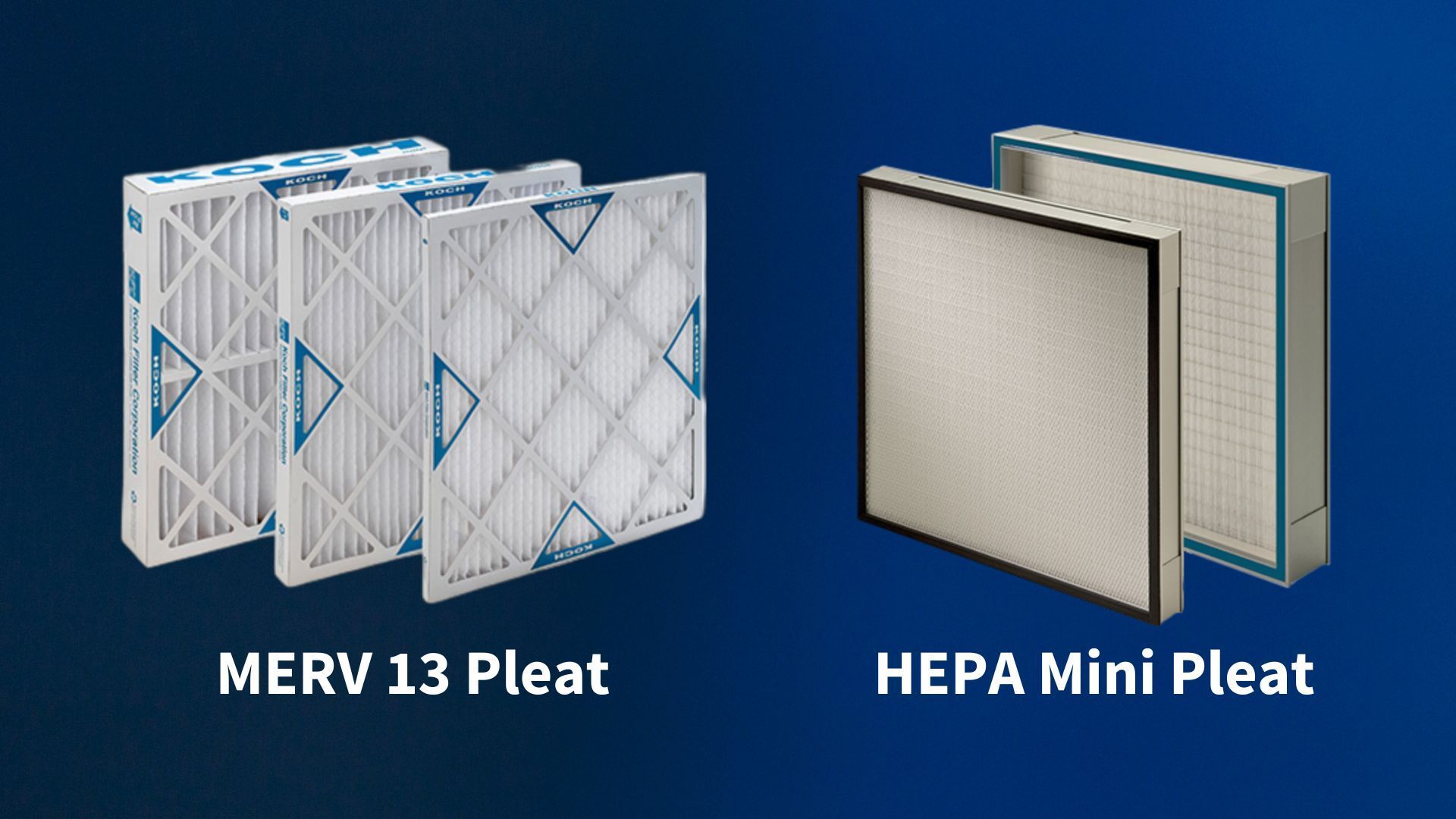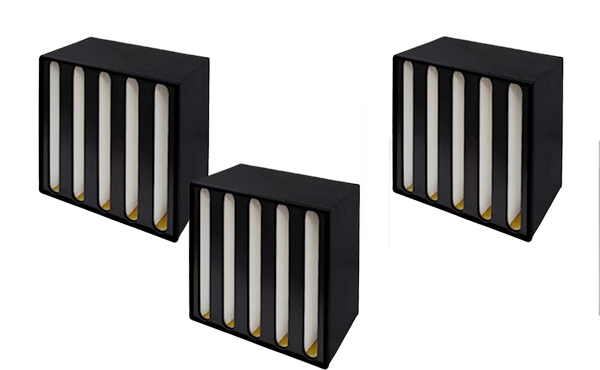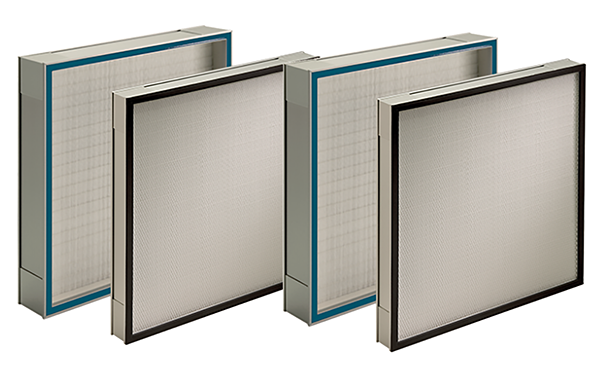Ryan Berkley, CAFS, is president of B&B Filters. As a certified air filter specialist by the National Air Filtration Association (NAFA), Ryan’s completed extensive training and testing in the field of air filtration and has a thorough understanding of air filtration principles, technologies and practices. This high level of filter expertise allows Ryan to provide school districts, universities, hospitals, manufacturers, laboratories, research facilities and others customized, quality solutions to their air filtration needs.
Comparing MERV 13 Air Filters to HEPA Air Filters

Air filters have been around for decades, playing a crucial role in improving our indoor air quality. Tracing their evolution from the early 20th century, when basic mesh filters were first used, we now have advanced options like MERV 13 air filters and HEPA air filters.
When it’s time to shop for replacement air filters, it’s important to understand which of the many air quality solutions are best for you. As you compare commercial air filters or industrial air filters, you may ultimately end up deciding between MERV 13 air filters and HEPA air filters. These filters serve different purposes and meet various filtration standards, capturing particles of varying sizes. As one of the air filter suppliers based in East Tennessee serving school districts, universities, manufacturing facilities, hospitals and more in Johnson City, Bristol, Knoxville, Atlanta and elsewhere, I always take time to explain the key differences between these two choices.
MERV 13 Commercial Air Filters
MERV 13 air filters are often used in HVAC systems. Their lower cost and ease of installation often make them the go-to choice when the focus is on enhanced ventilation and overall respiratory health.
They effectively capture larger particles like dust, mold spores, and allergens, typically removing more than 50% of particles down to 0.3 microns. High-efficiency MERV 13 air filters adhere to specific filtration standards and have a good efficiency rating, but they may not catch the smallest particulate matter.
Dr. Richard Corsi, an indoor air quality expert, emphasizes that MERV 13 filters strike an excellent balance between efficiency and cost. According to Dr. Corsi, while HEPA filters might offer superior filtration, MERV 13 filters provide a more practical solution for everyday use due to their lower maintenance requirements and easier installation process. The construction and material of MERV 13 filters are designed for extended usage, making them beneficial for maintaining clean air at a more affordable cost than HEPA filters. This makes them a versatile option for those concerned with air quality and respiratory health.
10 Reasons to Consider MERV 13 Filters
- Air Filters for Offices: Enhancing indoor air quality for employees by capturing dust, pollen, mold spores, and other pollutants.
- Air Filters for Healthcare Facilities: Including hospitals, clinics, and dental offices, where reducing the spread of airborne pathogens is critical.
- Air Filters for Schools and Universities: Improving the air quality in classrooms and common areas, promoting a healthier learning environment.
- Air Filters for Retail Stores and Shopping Centers: Providing cleaner air for shoppers and staff, enhancing the overall shopping experience.
- Air Filters for Hotels and Hospitality: Ensuring guest rooms and common areas maintain high air quality standards, enhancing guest comfort and satisfaction.
- Air Filters for Airports and Transportation Hubs: Reducing airborne contaminants in busy areas where large numbers of people congregate.
- Air Filters for Laboratories and Research Facilities: Maintaining a controlled environment by filtering out particulates that could affect experiments and research outcomes.
- Air Filters for Gyms and Fitness Centers : Improving air quality to provide a healthier environment for members during physical activities.
- Air Filters for Manufacturing Facilities: Protecting sensitive equipment and processes from airborne contaminants that could interfere with production quality, making them ideal industrial air filters.
- Air Filters for Data Centers: Ensuring clean air to protect sensitive electronic equipment from dust and particulate accumulation.
MERV 13 air filters are versatile and provide an excellent balance between filtration efficiency and airflow, making them ideal for these and other commercial applications where maintaining good indoor air quality is a priority.
HEPA Air Filters
In contrast, HEPA air filters, which originated during World War II to filter radioactive contaminants, offer unmatched efficiency and superior performance due to their construction and material. They capture at least 99.97% of particles down to 0.3 microns, including viruses and bacteria even smaller than that.
While HEPA filters provide superior performance, their cost and maintenance needs can be higher compared to MERV 13 filters. This high level of performance significantly enhances indoor air quality, making HEPA filters particularly beneficial for improving air quality in hospitals, laboratories, research facilities, and other environments where the highest air quality standards are necessary.
HEPA filters might offer the best defense against dust, mold spores, and other airborne contaminants. For that reason, they’re also ideal for homes where residents have severe allergies or respiratory issues.
Dr. Bill Wolverton, a former NASA scientist, said, “HEPA filters offer the gold standard in air filtration, effectively removing even the smallest particulate matter that other filters might miss.”
HEPA filters generally require more frequent replacements and specific installation adjustments to fit into existing HVAC systems, contributing to an increased overall cost. However, the benefits of HEPA air filters far outweigh the drawbacks for those prioritizing clean air and respiratory health.
Conclusion
Despite the higher efficiency of HEPA filters, both filter types play significant roles in improving indoor air quality. MERV 13 filters offer a balanced approach with lower costs and easier integration into existing systems. In contrast, HEPA filters provide exceptional filtration at a premium. The choice between MERV 13 and HEPA filters ultimately depends on specific needs, whether it’s for general air filtration use or specialized applications requiring the highest air purification standards.
For general office buildings, MERV 13 filters may be more than adequate, offering efficient filtration and easier maintenance. However, in cleanrooms or specialized manufacturing environments, HEPA filters may be necessary to meet specific air quality standards.
Understanding these applications can help businesses from Nashville to Atlanta to Johnson City and elsewhere make informed decisions about their air filtration systems.
If you have questions about your air filtration needs, email info@bnbfilters.com or call (423)-775-2932.
Share
Similar Posts










